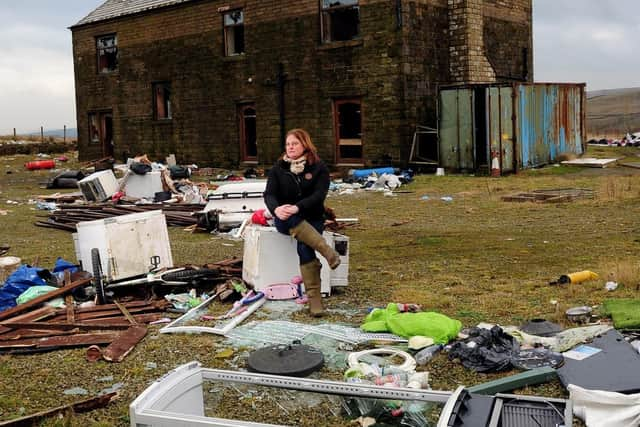Calderdale farmers ‘suffering in silence’ as burden of fly-tipping increases
and live on Freeview channel 276
Countryside communities have long been the target for offenders dumping rubbish in often isolated locations, but concerns are increasing over the number of cases and the impact that fly-tipping is having on the under-pressure budgets of farming businesses.
The NFU’s West Riding county chairwoman, Rachel Hallos, also claimed efforts to tackle fly-tipping were being undermined by a piecemeal approach.
Advertisement
Hide AdAdvertisement
Hide AdMrs Hallos, who farms in Ripponden, Calderdale, has just seen the resolution of a long-standing issue with fly-tipped rubbish on private land in the middle of her rented farm.


She said: “Every council has a different approach, some charge, some don’t, some have permit applications. I understand it depends on budgets, but if there were a unified programme in place it may help.”
The Department for Environment, Food and Rural Affairs released data which showed an eight per cent increase in incidents of fly-tipping on public land in 2018/19.
According to the data compiled by Farmers and Mercantile Insurance Brokers in Calderdale there were 1619 flytipping incidents in the borougg in 2017/2018.
Advertisement
Hide AdAdvertisement
Hide AdThe following year from 2018/2019 this figure increased by six per cent with a total of 1,719 flytipping incidents were recorded.
Of those 16 flytipping crimes were committed on agricultural land.
Tony Laking, of Farmers and Mercantile Insurance Brokers, said landowners and farmers were often left to deal with piles of rubbish dumped on their land with little or no assistance.
“Councils spend millions of pounds every year on clean-up costs but private landowners, such as farmers, are suffering in silence,” he said.
Advertisement
Hide AdAdvertisement
Hide AdThe Department for Environment, Food and Rural Affairs released data last month which showed an eight per cent increase in incidents of fly-tipping on public land in 2018/19.
However, Mr Laking, who works across Yorkshire, warned the figures did not accurately reflect the true scale of the problem faced by farmers and landowners.
“The burden of dumped rubbish falling squarely with farmers as they are liable for clearing it up at their own expense, or face prosecution.
“Moving the mess on to public land will not solve the issue, but exacerbate it, which farmers need to be mindful of.”
Data acts as a barometer
Advertisement
Hide AdAdvertisement
Hide AdThe Country Landowners Association (CLA) also said that, although the figures do not reflect the true scale of the crime, they did act as a barometer.
The CLA’s Yorkshire rural advisor, Libby Bateman, said the figures show that after a static year in 2018, fly-tipping had returned to a long-term upward trend.
“Our members are all too tired of not only cleaning up other people’s rubbish but paying for the privilege of doing so.
“It costs on average £1,000 to clean up each incident. With many rural businesses suffering multiple incidents, it can quickly affect the bottom line dramatically.”